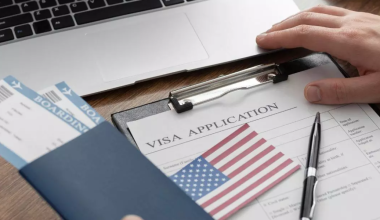Securing a permanent work visa in the United States is a crucial step for individuals seeking to build a long-term career in the country. The process can be complex and challenging, but with the right information and guidance, you can increase your chances of success. In this guide, we’ll walk you through the essential steps and provide valuable tips on how to obtain a permanent work visa in the USA.
- Understand the Types of Work Visas: Before diving into the application process, it’s important to be aware of the various types of work visas available in the USA. Common options include the H-1B visa for skilled workers, the L-1 visa for intracompany transfers, and the EB-2 and EB-3 visas for employment-based immigration.
- Identify Your Eligibility Criteria: Each visa category has specific eligibility requirements. Determine which visa aligns with your skills, qualifications, and employment situation. Understanding your eligibility is crucial to selecting the right visa category and streamlining the application process.
- Secure a Job Offer: Most work visas in the USA require a job offer from a U.S. employer. Start your journey by actively seeking employment opportunities and securing a job offer. Ensure that the job aligns with the qualifications and criteria set by the U.S. Citizenship and Immigration Services (USCIS).
- Employer Sponsorship: In many cases, your employer will need to sponsor your visa application. This involves submitting necessary documentation to the USCIS, demonstrating the need for your skills, and confirming that the job offer meets the required standards.
- Labor Certification (if applicable): Some employment-based visas, such as the EB-2 and EB-3 visas, may require labor certification. This process involves your employer demonstrating that there are no qualified U.S. workers available for the job, ensuring that the employment of a foreign worker will not negatively impact the local job market.
- File Petition with USCIS: After securing a job offer and completing any necessary labor certification, your employer will file a petition with the USCIS. It’s essential to ensure that all required documents are accurate and submitted within the specified timelines.
- Wait for Visa Approval: Once the USCIS approves the petition, you may need to wait for visa availability, especially in the case of employment-based preference categories. Stay informed about visa bulletin updates and prepare for the next steps in the process.
- Consular Processing or Adjustment of Status: Depending on your situation, you may go through consular processing at a U.S. embassy or consulate abroad or adjust your status if you are already in the United States. Follow the prescribed steps for your specific visa category.
Benefit of Working In USA As A Foreigner
Working in USA can be very interesting for foreigners. Working in the United States as a foreigner can offer numerous benefits, both professionally and personally. Here are some key benefits you should expect from working and living in USA:
- Career Opportunities: The USA boasts a diverse and dynamic job market with opportunities in various industries. Working in the country provides access to a wide range of career options, allowing individuals to explore and advance in their chosen fields.
- Professional Development: The United States is home to many world-renowned companies and institutions, offering a fertile ground for professional development. Working alongside talented and diverse professionals can enhance your skills, broaden your knowledge, and contribute to your overall career growth.
- Competitive Salaries: Many jobs in the USA come with competitive salaries and benefits, which can contribute to a comfortable standard of living. The compensation packages offered by U.S. employers often include health insurance, retirement plans, and other perks.
- Networking Opportunities: The U.S. is a global hub for networking and collaboration. Working in the country allows you to build a strong professional network, fostering connections that can be valuable for your current position and future career endeavors.
- Cultural Exposure: Immersing yourself in the American workplace provides an opportunity to experience and adapt to different work cultures. Exposure to diverse perspectives can enhance your ability to collaborate with individuals from various backgrounds, a valuable skill in today’s globalized world.
- Access to Cutting-Edge Technologies: The U.S. is at the forefront of technological innovation, and working in the country can provide exposure to cutting-edge technologies and methodologies. This can be particularly beneficial for individuals in fields such as information technology, research, and development.
- Educational Opportunities for Dependents: For those with families, working in the USA often comes with educational benefits for dependents. Access to quality education and prestigious universities can be a significant advantage for children pursuing academic excellence.
- Potential Path to Permanent Residency: Some work visas, such as the H-1B and employment-based green cards, offer a pathway to permanent residency (green card) in the United States. This can provide long-term stability and the opportunity to establish a permanent home in the country.
- Cultural and Recreational Experiences: The USA is known for its diverse cultural and recreational offerings. Working in the country allows you to explore and enjoy a wide range of activities, from arts and entertainment to outdoor adventures, contributing to a rich and fulfilling lifestyle.
- Global Career Recognition: Professional experience in the United States is often highly regarded globally. Having U.S. work experience on your resume can enhance your marketability and open doors to career opportunities in other parts of the world.
Benefit of Acquiring A Permanent Work Visa In USA
Obtaining a Permanent Work Visa in the United States can bring about a multitude of benefits, providing individuals with stability, security, and the opportunity to build a long-lasting life and career in the country. Here are some key advantages:
- Long-Term Residency: A Permanent Work Visa, such as an employment-based green card, offers the privilege of long-term residency in the United States. This stability allows individuals to establish roots, build a home, and integrate into their local communities.
- Freedom to Change Jobs: Unlike certain temporary work visas that tie the individual to a specific employer, a Permanent Work Visa grants the freedom to change jobs without jeopardizing immigration status. This flexibility allows individuals to pursue new career opportunities and advancements.
- Access to Social Benefits: Permanent residents in the U.S. are generally eligible for certain social benefits, such as Social Security benefits and Medicare. These benefits contribute to financial security and healthcare coverage, enhancing the overall quality of life.
- Educational Opportunities: Permanent residents have access to educational opportunities in the U.S., including enrollment in public schools and universities. This can be particularly advantageous for families with children seeking a quality education.
- Pathway to U.S. Citizenship: Holding a Permanent Work Visa is often a crucial step towards U.S. citizenship. Permanent residents can apply for naturalization after meeting the residency requirements, allowing them to fully participate in the civic life of the country.
- Travel Flexibility: Permanent residents enjoy greater flexibility in international travel. While there are still certain travel requirements and considerations, having a green card allows individuals to travel outside the U.S. for extended periods without jeopardizing their residency status.
- Investment Opportunities: Permanent residents have the freedom to invest in real estate, start businesses, and engage in various economic activities. This opens up avenues for financial growth and wealth-building opportunities.
- Sponsorship for Family Members: Holding a Permanent Work Visa allows individuals to sponsor certain family members for permanent residency. This includes spouses, unmarried children, and sometimes other relatives, fostering family reunification.
- Equal Treatment in the Workplace: Permanent residents are entitled to equal treatment in the workplace, enjoying the same employment rights and protections as U.S. citizens. This includes access to legal remedies in case of workplace disputes.
- Global Job Market Advantage: U.S. work experience and holding a green card can provide a significant advantage in the global job market. Employers worldwide often value the skills and experiences gained in the U.S., opening up diverse career opportunities.
How To Start Working In USA This Year
Starting to work in the USA this year involves several key steps, from securing a job offer to obtaining the necessary visa needed to work. Here is a simple guide that will help you start this process.
1. Determine Eligibility and Visa Type:
- Identify the type of visa that suits your situation. Common work visas include H-1B for specialized workers, L-1 for intracompany transfers, and O-1 for individuals with extraordinary abilities.
2. Job Search and Secure Employment:
- Start your job search by leveraging online platforms, networking events, and industry-specific job fairs.
- Tailor your resume to meet U.S. standards, highlighting your skills and experiences.
- Secure a job offer from a U.S. employer. Ensure that the job aligns with the requirements of your chosen visa category.
3. Understand Employer Sponsorship:
- Most work visas require employer sponsorship. Your U.S. employer will need to file a petition on your behalf with the United States Citizenship and Immigration Services (USCIS).
4. Prepare Necessary Documents:
- Work closely with your employer to gather all required documents for the visa application.
- Documents may include educational credentials, professional certifications, a valid passport, and any other specific requirements based on the visa type.
5. File Petition with USCIS:
- Your employer will submit the petition to the USCIS, including the required filing fees.
- USCIS will review the petition, and upon approval, they will issue a Notice of Action (Form I-797).
6. Wait for Visa Processing:
- If you are outside the U.S., once the petition is approved, you will need to apply for a visa at the U.S. embassy or consulate in your home country.
- If you are already in the U.S., you may need to go through a change of status process.
7. Attend Visa Interview (if applicable):
- If you are applying for a visa from outside the U.S., attend a visa interview at the U.S. embassy or consulate.
- Be prepared to answer questions about your employment, qualifications, and intent to return to your home country.
8. Receive Visa Approval:
- Upon successful completion of the visa interview and approval, you will receive your visa stamp in your passport.
9. Travel to the U.S.:
- Book your travel to the U.S. and go through the customs and border protection process upon arrival.
- Ensure you have all necessary documents, including your visa, passport, and Form I-797.
10. Report to Work:
- Once in the U.S., report to your new employer and commence your employment.
- Familiarize yourself with U.S. workplace norms and regulations.
11. Comply with U.S. Laws and Regulations:
- Stay informed about U.S. immigration laws and regulations to ensure compliance throughout your stay.
- Keep track of visa expiration dates and initiate any necessary extensions or changes in status.
12. Explore Permanent Residency Options:
- If you plan to stay in the U.S. long-term, explore pathways to permanent residency, such as employment-based green cards.
13. Build a Support System:
- Establish a support system by networking with colleagues, joining professional organizations, and getting involved in local communities.
Companies In USA Offering Jobs To Foreign Workers With Permanent Work Visa
Numerous companies in the United States hire foreign workers with permanent work visas, providing opportunities for skilled professionals to contribute to the country’s diverse workforce. The availability of jobs can vary across industries and regions. Here are some examples of industries and companies that have historically sponsored foreign workers:
Technology and Information Technology (IT):
- Google (Alphabet Inc.):
- Google is known for its global workforce and often sponsors foreign workers in various tech roles.
- Microsoft:
- Microsoft has a significant presence in the technology sector and actively recruits foreign talent.
- Apple Inc.:
- Apple hires foreign workers for a range of positions, particularly in software development, hardware engineering, and other technical roles.
Financial Services:
- JPMorgan Chase & Co.:
- As one of the largest financial institutions, JPMorgan Chase hires foreign workers in finance, technology, and related fields.
- Goldman Sachs:
- Goldman Sachs is known for recruiting skilled professionals from around the world, particularly in finance and investment banking.
Consulting:
- McKinsey & Company:
- As a global management consulting firm, McKinsey often hires foreign workers with expertise in business, strategy, and management.
- Boston Consulting Group (BCG):
- BCG is another major consulting firm that may offer opportunities for foreign workers in various capacities.
Healthcare and Pharmaceuticals:
- Johnson & Johnson:
- Johnson & Johnson, a multinational pharmaceutical and healthcare company, may hire foreign workers in research, development, and other specialized roles.
- Pfizer:
- Pfizer, known for its work in the pharmaceutical industry, may have opportunities for foreign workers in research and development.
Engineering and Manufacturing:
- Boeing:
- Boeing, a major aerospace and defense company, may hire foreign workers with expertise in engineering and aviation.
- General Electric (GE):
- GE is involved in various industries, including aviation, healthcare, and renewable energy, and may sponsor foreign workers in specialized roles.
Social Media and E-commerce:
- Facebook:
- Facebook, now part of Meta, is a global tech company that may offer opportunities for foreign workers in areas such as software development, data science, and marketing.
- Amazon:
- As one of the world’s largest e-commerce and technology companies, Amazon may hire foreign workers in various roles, including logistics, technology, and management.
Renewable Energy and Environmental Sciences:
- Tesla:
- Tesla, led by Elon Musk, focuses on electric vehicles and sustainable energy solutions, offering opportunities for foreign workers with relevant skills.
- NextEra Energy:
- NextEra Energy, a renewable energy company, may have openings for foreign workers in the field of clean energy and sustainability.
Tips for Job Seekers:
- Use Job Platforms: Leverage job search platforms like LinkedIn, Glassdoor, and Indeed to find companies actively hiring foreign workers.
- Network: Attend industry events, join professional organizations, and network with professionals in your field to discover potential job opportunities.
- Consult with Immigration Experts: Seek guidance from immigration attorneys or consultants to navigate the visa application process effectively.
Keep in mind that the job market is dynamic, and company policies can change. It’s essential to research specific companies, stay updated on job listings, and tailor your application to match the requirements of the positions you are interested in. Additionally, always ensure compliance with U.S. immigration laws throughout the application process.
Obtaining a permanent work visa in the USA is a significant milestone that opens doors to long-term professional opportunities. By understanding the visa categories, meeting eligibility criteria, securing a job offer, and navigating the application process with precision, you can increase your chances of a successful outcome. Keep in mind that immigration laws are subject to change, so it’s advisable to consult with an immigration attorney or seek updated information from official government sources throughout your application journey.





